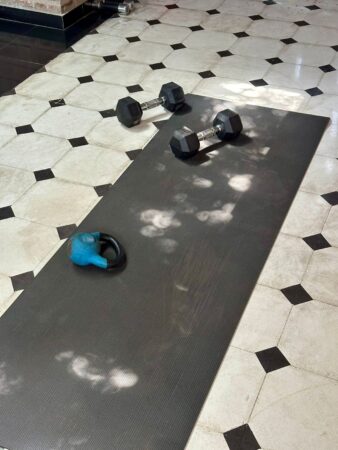
There is ongoing debate about whether an obsession with physical fitness is beneficial or harmful. Like any extreme behavior, excessive focus on fitness can have its downsides. However, from my own experience and observation, I have seen that physically fit individuals tend to handle difficult situations with greater resilience and less stress.
The connection between physical fitness and mental well-being is well-researched. One such study highlights that exercise can be more effective than medication in managing mental health conditions (University of South Australia, 2023). The stronger and healthier we feel physically, the better equipped we are to manage life’s challenges.
Strength in Times of Grief and Loss
Let’s talk about loss and grief specifically. When we experience emotional trauma, our body copes in various ways—sometimes manifesting stress through physical illness. If we are physically weak, our ability to endure emotional hardship diminishes significantly.
Postpartum depression is a well-documented reality. As a mother of three, I have lived through its challenges. However, I have always maintained some form of movement in my life—whether dancing since the age of five, practicing yoga, or engaging in regular workouts. This consistency in physical activity has been a key factor in my ability to endure some of the most difficult experiences of my life.
Now, let me be honest—I am lazy. In a magical world, no one would need to exercise, and we could all just be couch potatoes and stay effortlessly fit. That fantasy is very appealing, and trust me, I love the idea of never having to lift a finger and still looking and feeling strong. But unfortunately, that’s just wishful thinking. While I might daydream about a world where fitness requires no effort, I know deep down that movement makes me feel alive. I love the sensation of sweat on my body, the rush of endorphins after a workout, and, most importantly, the confidence that comes from knowing I am physically strong.
During my firstborn’s medical journey, his first open-heart surgery was scheduled just 72 hours after birth. He remained in the ICU for over 45 days. The hospital was 1.5 hours away—one way. Just two days postpartum, I traveled that distance almost daily to provide him with breast milk. Had I not been physically fit or had I undergone a C-section, the physical rigor of this experience might have broken me. Years of Bharatanatyam, whose basic stance – Aremandi, maintaining a strong pelvic stance, and prioritizing fitness had unknowingly prepared me for this immense challenge.
Later, as a single mother, I found myself balancing a 1.5-hour work commute each way, raising my children, driving them to their classes, and overseeing the construction of a new home for us. The stress was relentless. But I could handle it because I was fit. As a thalassemia minor, I am naturally anemic, which means my energy levels are already compromised. Yet, my dedication to fitness has been a pillar of my emotional and physical resilience.
Trusting Your Inner Strength in Difficult Times
Beyond the physical, movement has always provided me with a sense of internal trust. Every time I felt depressed or overwhelmed, I noticed that the more I exercised, ran, or danced, the stronger I felt—not just physically, but emotionally. I didn’t always need external anchors because I could trust in my own ability to process and handle hardship. Movement became an internal compass, a reminder that I had the strength to navigate life’s difficulties.
A Balanced Approach to Fitness
Does this mean physical fitness is the answer to everything? No. Obsession over fitness is unhealthy, but choosing to stay fit, healthy, and strong equips us to manage ourselves better—without placing the burden of our well-being on others. It provides us with a personal mechanism to battle anxiety, fear, and mental chaos.
Find a movement routine that resonates with you—perhaps 15-30 minutes a day. It does not matter what form it takes. What matters is consistency—whether it’s two or three times a week. Short bursts of intense workouts followed by long periods of inactivity will not yield lasting benefits. Much like meditation, true transformation comes from daily habits—what we do physically, spiritually, emotionally, and financially shapes our healing and happiness.
Staying fit and healthy is not just about looking good. It is about cultivating the ability to experience joy, withstand adversity, and navigate life with strength.
Disclaimer: There are countless inspiring individuals with physical limitations who have lived far richer and more fulfilling lives than many fully able-bodied people. However, these are exceptions, not the rule. For most of us, refining and retaining our physical strength enhances our ability to live life fully






